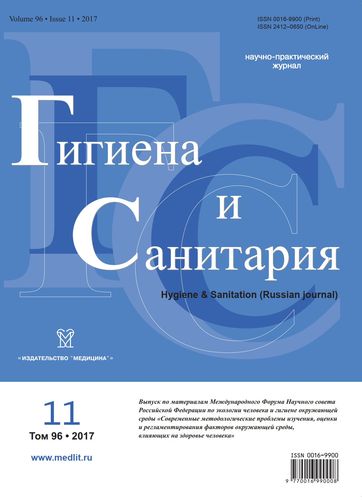Biological indices in the monitoring system of urbanized soils
- Authors: Vodyanova M.A.1, Kriatov I.A.1, Donerian L.G.1, Evseeva I.S.1, Ushakov D.I.1, Sbitnev A.V.1, Kiryakova N.A.1, Antropova N.S.1, Pyrkin V.O.1, Tsapkova N.N.2, Bashirov E.V.3
-
Affiliations:
- Center for Strategic Planning and Management of Biomedical Health Risks
- I.M. Sechenov First Moscow State Medical University
- Peoples’ Friendship University of Russia
- Issue: Vol 96, No 11 (2017)
- Pages: 1091-1096
- Section: SOCIO-HYGIENIC MONITORING
- Published: 21.10.2020
- URL: https://rjsocmed.com/0016-9900/article/view/640742
- DOI: https://doi.org/10.47470/0016-9900-2017-96-11-1091-1096
- ID: 640742
Cite item
Full Text
Abstract
Current methodological guidelines for assessing the quality of soils in populated areas do not include ecotoxicological indices, thereby underestimate the potential danger of the negative impact of urban soils on the health of the population. Monitoring of soil quality is carried out according to established indices. Sanitary-parasitological and sanitary-bacteriological studies, of course, play a primary role in the establishment both of the category of soil contamination in populated areas, and basic physic-chemical parameters. The list of controlled elements contains heavy metals, benz (a) pyrene, arsenic and several others, but there are no whole classes of chemical compounds with a high level of public health hazard, such as polychlorinated biphenyls, in spite of the fact that the study of the distribution of this group of substances in the soil profile of Moscow is being included in modern scientific research work for a long time. Thus, the lack of data on the content of a number of key chemical toxicants in the soil can form a distorted final assessment of the quality of the studied soils. Ultimately, this can lead to a number of mistakes in management decisions for the improvement of the territories of Moscow and the replacement of soils with artificially created soil. One of the solutions to this problem may be the expansion of the list of physic-chemical indices in monitoring. Another one is the inclusion of ecotoxicological indices for conducting a comprehensive diagnosis of "health" of soils. Such an approach will make it possible to assess the soils more correctly, taking into account all the factors of soil formation in the territory of Moscow, including intensive multifactor anthropogenic impact on soils, which is difficult to estimate only with the help of physical and chemical methods. In the work results of own researches on an estimation of the biological activity of soils of Moscow of various functional zones are presented.
About the authors
Mariia A. Vodyanova
Center for Strategic Planning and Management of Biomedical Health Risks
Author for correspondence.
Email: lab.pochva@sysin.ru
ORCID iD: 0000-0003-3350-5753
MD, PhD, DSci., acting the head of laboratory of soil hygiene of the Center for Strategic Planning and Management of Biomedical Health Risks.
e-mail: lab.pochva@sysin.ru
Russian FederationI. A. Kriatov
Center for Strategic Planning and Management of Biomedical Health Risks
Email: noemail@neicon.ru
ORCID iD: 0000-0002-1335-1606
Russian Federation
L. G. Donerian
Center for Strategic Planning and Management of Biomedical Health Risks
Email: noemail@neicon.ru
ORCID iD: 0000-0002-9718-0663
Russian Federation
I. S. Evseeva
Center for Strategic Planning and Management of Biomedical Health Risks
Email: noemail@neicon.ru
ORCID iD: 0000-0001-5765-0192
Russian Federation
D. I. Ushakov
Center for Strategic Planning and Management of Biomedical Health Risks
Email: noemail@neicon.ru
Russian Federation
A. V. Sbitnev
Center for Strategic Planning and Management of Biomedical Health Risks
Email: noemail@neicon.ru
Russian Federation
N. A. Kiryakova
Center for Strategic Planning and Management of Biomedical Health Risks
Email: noemail@neicon.ru
Russian Federation
N. S. Antropova
Center for Strategic Planning and Management of Biomedical Health Risks
Email: noemail@neicon.ru
Russian Federation
V. O. Pyrkin
Center for Strategic Planning and Management of Biomedical Health Risks
Email: noemail@neicon.ru
Russian Federation
N. N. Tsapkova
I.M. Sechenov First Moscow State Medical University
Email: noemail@neicon.ru
Russian Federation
E. V. Bashirov
Peoples’ Friendship University of Russia
Email: noemail@neicon.ru
Russian Federation
References
- Resolution of the Government of Moscow № 514-PP «On improving the quality of soil in the city of Moscow». Moscow; 2004. (in Russian)
- Federal Law № 384-FZ «Technical Regulations on the Safety of Buildings and Structures». Moscow; 2009. (in Russian)
- Resolution of the Government of the Russian Federation № 20 «On engineering surveys for the preparation of project documentation, construction, reconstruction of capital construction projects». Moscow; 2006. (in Russian)
- SP 47.13330.2012. Engineering surveys for construction. Basic provisions. Moscow; 2012. (in Russian)
- Ignat’eva I.A. Technical regulations with requirements in the field of environmental protection: opportunities, problems, prospects. Biznes, menedzhment i pravo. 2014; (1). (in Russian)
- Meinardi C.R. Soil quality. Fertile ground for standardization. ASTM Standardization News. 1996; (2): 8–12.
- Agreement on the conduct of a coordinated policy in the field of standardization. 15th IGU meeting: There are problems, there are no disagreements. Standarty i kachestvo. 1999; (7): 3–6. (in Russian)
- Interim technical report. Activity block 10 – Environmental quality standards. St. Petersburg; 2008. (in Russian)
- Carlon C., ed. Canadian Guiding Principles (CCME, 1999). Derivation methods of soil screening values in Europe. A review and evaluation of national procedures for harmonization. Ispra: European Commission, Joint Research Center; 2007.
- GOST R ISO 23909–2013. Soil quality. Preparation of laboratory samples from large samples. Moscow; 2013. (in Russian)
Supplementary files









